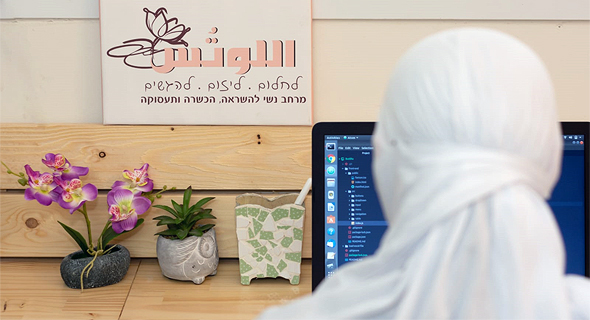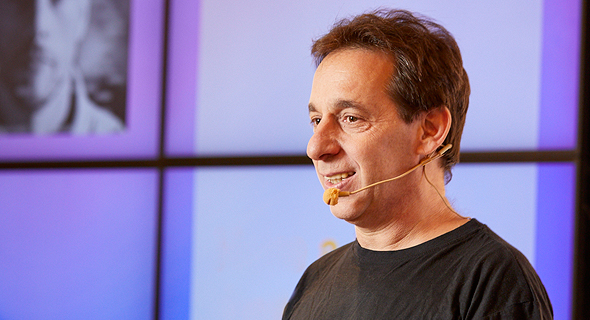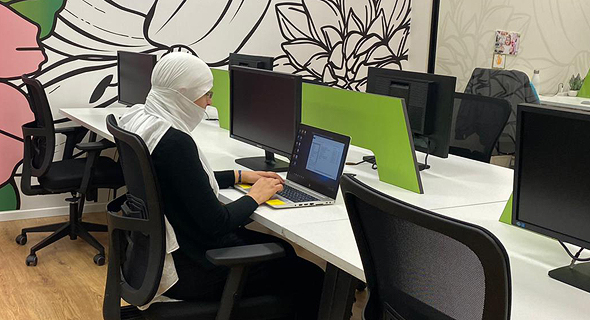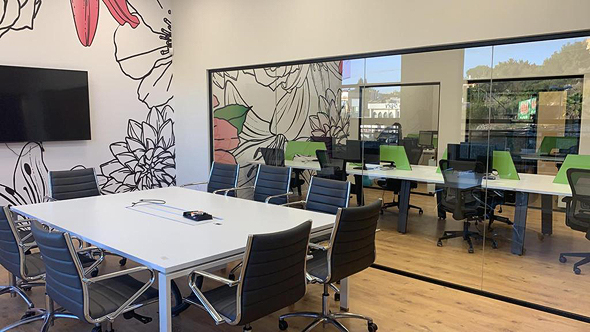Interview
Fintech company Finastra-Israel brings Druze female programmers to the forefront
“What’s beautiful is that we’ve created a beautiful community of women who’ve dreamed big,” says head of Druze female boot camp on shattering stereotypes and encouraging workplace diversity
10:0710.01.21
As the tech workforce grows, it is expanding to incorporate and properly reflect different parts of Israeli society. As part of those efforts, British fintech company Finastra, which is the third-largest of its kind in the world and works with several global banks, has aimed to make diversity a part of its platform. Finastra’s Israel branch, based in Kfar Saba, works with some of the leading global players and helps process payments online, totaling some $20 trillion every day. Those include major U.S. banks Goldman Sachs, Citibank and Bank of America, U.K. groups Barkley’s, Lloyd’s, and HSBC, as well as other major South African, Brazilian, and Australian banks.
 A Druze female programmer works at the Lotus tech hub in northern Israel. Photo: Jinan Halabi
A Druze female programmer works at the Lotus tech hub in northern Israel. Photo: Jinan Halabi
 General Manager of Payments at Finastra Israel Sagive Greenspan. Photo: Alan Chapelski
General Manager of Payments at Finastra Israel Sagive Greenspan. Photo: Alan Chapelski
 A female Druze programmer works in the Lotus hub's shared office space. Photo: Maysa Halabi Alsheikh
A female Druze programmer works in the Lotus hub's shared office space. Photo: Maysa Halabi Alsheikh
 The Lotus hub's open work space provides religious Druze women with a safe place to work remotely for high tech companies. Photo: Gali Segev
The Lotus hub's open work space provides religious Druze women with a safe place to work remotely for high tech companies. Photo: Gali Segev
Finastra aims to make diversification more than simply a slogan and has implemented this idea by incorporating people from across a diverse spectrum, including Jewish ultra-Orthodox women who work in its development teams, LGBTQ+ employees who joined under the umbrella campaign of LGBT Tech, and most recently, seven religious Druze female programmers from the small community of Daliyat el-Karmel in northern Israel.
 A Druze female programmer works at the Lotus tech hub in northern Israel. Photo: Jinan Halabi
A Druze female programmer works at the Lotus tech hub in northern Israel. Photo: Jinan Halabi CTech spoke to the General Manager of Payments at Finastra-Israel Sagive Greenspan, as well as with the woman behind the entire female Druze programming nonprofit platform, Lotus, that encourages religious women of the Druze and Islamic faiths to do the formerly unthinkable and become programmers in the tech sector. Maysa Halabi Alshekh started Lotus, and it provides religious Druze women with a safe joint workspace to work remotely from their small town, and use their exquisite software programming skills to manage large payments. Lotus trains the women in a special programming boot camp to become full-stack developers and enter the high tech workforce while still adhering to their religious practices and beliefs.
“What’s beautiful is that we’ve created a beautiful community of women who’ve dreamed big,” Alshech told CTech in an interview, when discussing the program and how she hopes this will shatter stereotypes and encourage workplace diversity.
“Finastra has over 65,000 customers all from financial institutions and is the third-largest fintech company in the world,” Greenspan told CTech. In Finastra’s Israel division there are about 350 employees, and in the company’s entire payment division there are around 700 employees. It is the largest provider of payment systems in the world and allows banks to transfer over $20 trillion a day. “We work with some of the biggest banks out there,” he added, “including those in the U.S., Europe, South America, South Africa, and Australia,” he said.
“The work with Lotus is part of our overall values when it comes to inclusion as a whole, which is a part of how we like to see our corporate responsibility. We’re doing well by doing good, and are constantly looking for ways to do good,” he said. “Diversification comes in many colors, such as supporting LGBT Tech, (which aims to promote LGBTQ+ individuals into the tech sector), that we employ 30 Jewish ultra-Orthodox women in our development division or the fact that at Finastra-Israel 45% of employees in the payments division are women,” he said and listed several important female figures and managers at the company in both the Israel division and abroad.
“Our VP of R&D is female, Hemdat Cohen-Shraga; VP of payments in the U.S. Malinda Robey, head of payment customer care Keren Blum, and half of our management is women,” he said. “They are chosen not because they're female, but because they are the best employees out there. We just got the best people out there, who also happened to be women.”
Greenspan elaborated on how Finastra started working with the Lotus hub. The team visited Daliyat el-Karmel and met with some of the female programmers three months ago, “we were excited about the opportunity, and by the fact that we are really changing their future,” he said excitedly. “If you have the opportunity to change someone’s future, then that’s probably the biggest accomplishment you can make.”
Afterward, Finastra interviewed a few of the candidates and got them engaged in the development of the company’s product.
“They are helping develop our product,” he noted, adding, “what I like about them is that we had very good chemistry from the beginning. We liked them as people and as employees. To some extent we both come from similar values - they are hard workers, loyal, they care, and are dedicated to the job at hand.”
Shortly afterward, seven of them joined the Finastra-Israel team, working remotely from their location in northern Israel. “I assigned one of my leads to manage them directly, Senior Product Manager Lilach Harel, and she is working with them, managing them, and guiding them day in and day out.”
 General Manager of Payments at Finastra Israel Sagive Greenspan. Photo: Alan Chapelski
General Manager of Payments at Finastra Israel Sagive Greenspan. Photo: Alan Chapelski So how did Finastra manage to draw them in?
“It was all the women. We started with three Druze female programmers, but slowly as these women realized they were working with some of the biggest banks in the world - and were successful - they wanted more. They inspired their friends to join. Finastra started employing three of those programmers, and extended it to seven, with another four who plan on joining soon.”
“I think that during this time, when a lot of populations are suffering from the pandemic it’s very important that tech companies put a special focus on diversity and of combining different cultures in the workplace. Doing well by doing good takes on an extra emphasis. It amplifies the need to help others.”
On a separate note, he added “We are calling this the new version of Zionism, to include all kinds of Israeli groups from all over the country into the mainstream - even if they aren't mainstream, because within a few years we’ll change the way things look, and they’ll become the mainstream.”
Alshekh single-handedly founded the all-female hub. She spoke of how she became part of the religious Druze community and studied education prior to forming the hub, which is not for profit, and works with Finastra, Amdocs, Radcom, Oranbit, Netafim, Vayyar Imaging, and others. It has received support from the Israeli Ministry of Finance as well as the welfare division of the Ministry of Labor, Social Affairs, and Social Services. Although she loves technology, she isn’t a programmer herself but was the driving force to inspire social change and the founder of the organization.
The hub recruits young women between the ages of 18-32 from the Druze Arab village, who majored in STEM subjects in high school, tests them, and those who pass attend a specially designed boot camp, whose syllabus is updated routinely. The women then remotely work out of the shared office space for other companies in software programming. The field of high tech in Israel is only comprised of 25% women, of that number 0.1% are Arab women or those from the Druze or Muslim religions.
“That’s crazy,” Alshekh told CTech, “that number should be much higher.”
How hard is it being a woman in this mostly-male field?
“It was hard. Our group is only made up of women, and for those in our group this is their love - they love computers, they’re crazy about technology, they love to take apart and assemble computers.”
Part of the problem, she thinks stems from the fact that women are mainly pushed toward educational fields, such as teaching or caregiving, and while that is important it can hold women back from straying from the fray and entering other sectors, such as tech, STEM, and finance.
For religious women in particular, going against the herd is not kindly accepted by any society, and this is especially prevalent in Orthodox Jewish communities, adherent Muslims, and in the Druze community.
“We really need to open up this field up to women,” she said. “Often, the Arab community thinks entering the high tech field in Israel is unattainable. For religious Druze women, and for many religious Jews too, I presume, often you have to choose between being a mother and having a career, but we want women to know that you can do both.”
The women at the Lotus hub love programming, she added. “We’re doing what we want to do, and I think it’s not only for our own benefits and for those of our families, but it goes beyond that. We’re doing this for the sake of the next generation. We want to show girls out there that they can choose this path, that it’s possible.” While the Druze community is very close-knit and working out of a skyscraper in Tel Aviv in an office with men may not be so in line with their religious principles, Lotus has designed an office space that caters to that exact niche.
Its offices incorporate a shared workspace, equipped with new computers, a conference room, and even a play area, where women can bring their children to work.
 A female Druze programmer works in the Lotus hub's shared office space. Photo: Maysa Halabi Alsheikh
A female Druze programmer works in the Lotus hub's shared office space. Photo: Maysa Halabi Alsheikh Was it particularly hard being a woman of faith - something that perhaps your community looked down upon - as having women enter this fast-paced workforce?
“Well, we did receive a blessing from the Druze religious leaders. On one hand, we wanted to preserve our religious traditions and identity, while on the other we wanted to expand our future and reach fields that might clash with those beliefs, such as tech. We wanted to combine the two and make it possible for women of our faith to adhere to tradition, and still integrate into the sector.”
She explained that the Druze population in Israel is made up of some 140,000 people, and comprises 1.4% of the Israeli population. However, because of strict religious adherences and observing tradition, women typically can’t pursue separate areas to study outside of traditional gender-specific subjects such as education. In accordance with the Druze faith, women aren’t encouraged to work outside of the village. These women that Lotus has recruited score particularly high in areas such as mathematics and English, yet can’t study in university. “There aren't many opportunities to choose from or break into,” she said.
So you created a solution for that?
“Yes. I thought of how we have so many talented women here, yet that talent is being wasted,” she said and added. “I’d always read articles on Calcalist saying how there weren’t enough female programmers out there, and I asked myself why we couldn’t fill that gap? Why couldn’t we work in those fields? The Israel Innovation Authority has plenty of opportunities to help women enter the workforce, and I’ve met some amazing women that way who have encouraged me.”
Rami Schwartz from the Portland Trust was one of those people who helped form Lotus, his organization strives to help weak populations and close social gaps. The foundation helped build and construct the office workspace in northern Israel, and is focused on enhancing economic opportunities for Arab and Jewish ultra-Orthodox societies, as well as other periphery communities. The Portland Trust also crafted the professional program from the candidates screening, toward training and finally integrating the women in leading high tech firms with a personal on-boarding program for each woman. This careful process results in a 100% retention rate of the women in their positions.
The program is in its fourth month and has educated some 29 Druze women to be full-stack developers.
“In the beginning it was hard. We had to go around our town and knock on people’s doors. We even asked them to be volunteers. In the beginning, we had nothing, just a dream. Once we started our boot camp, things really started to pick up,” she said.
“We knew we needed to make women a place that they could work in and feel safe. Some 40% of them are even mothers, yet the common denominator among them is that they love technology and aren’t afraid of changes.”
So is Lotus just a training camp and then the women are off on their own?
“No, Lotus is a hub that accompanies these women after boot camp. Within those eight months, we have a sort of learning marathon of the hottest topics in programming and computer science. We also incorporate academia. We want to make sure that the women in our group can offer a strong tech advantage for tech companies. Our hub doesn’t only train and help women join companies, it also helps them after they get accepted. We are a sort of social buttress for these women, a safe space if you will. While we are a nonprofit, we do receive donations and funding from the Israeli government.”
 The Lotus hub's open work space provides religious Druze women with a safe place to work remotely for high tech companies. Photo: Gali Segev
The Lotus hub's open work space provides religious Druze women with a safe place to work remotely for high tech companies. Photo: Gali Segev It can be incredibly difficult as a woman to adhere to religious faith while working in a male-dominated field. It’s also hard to “stray from the fray” especially for religious women of many faiths where modesty and humility are important values, yet aren’t necessarily accepted or embraced by the corporate world. What is your message to religious women out there who want to break into these types of sectors?
“First of all, I think it goes without saying that these are things that religious women, of any faith, struggle with. I remind myself daily that as women we choose to be religious. Our faith is important to us. It definitely becomes much easier when you have a like-minded community around you supporting you. We’re doing it together, we’re talking about these things with other women. But, I can say that sometimes feeling strange or unaccepted by male peers is legitimate. However, the Israeli community is embracing us in this aspect despite the social and cultural gaps.”
“It’s usually very difficult for young Arab girls to learn how to say no, and now we know what we must do or say in the workplace. It’s difficult for us because we’re very modest and it’s hard for us to express ourselves. Now, with Lotus, we have more security, and more self-confidence to be able to express ourselves in the workplace.”
She added that Lotus has incorporated some traditional Muslim women as well, although religious Muslim women have yet to join. “We want women to enter the high tech workforce together, it makes them feel more secure. We’re also giving our children better education, we’re showing them that women can enter the workforce.”
"The goal is ultimately to establish a robust high tech Hub, so that every talented young woman in the community will know she has a bright future once she exploits her potential," she said.
So what is your message to women in the corporate world in general?
“Women should be successful in these fields, and I want to let them know that they’re not alone. We’re stronger as a community when we’re together. We’re also making a better future for the next generation. And you’ll inspire other girls to be like you when they grow up.”



